“Fasten your seatbelt”, a gray-haired driver tells me before turning on the engine. The ride to the outskirts of Lopburi is just five minutes long, but as someone with a Thailand visa overstay fine hanging above their head, I happily oblige. We’re going to a prison after all, where our closest relatives, 2.000 of them, await our visit scheduled at 10:30 a.m. That would be breakfast time at the Lopburi Monkey Festival.
“This is the first time we’ll be feeding them in the enclosure”, explains Wibool Chanyam (76) as we leave behind Phra Prang Sam Yod, the 13th-century Khmer ruin known as Lopburi Monkey Temple. In past decades, the long-tailed macaques have swarmed this iconic three-spired landmark. But since the town decided to remove them from the center, most monkeys are now detained at Lopburi Municipality Animal Shelter, the “monkey prison”.
Lopburi Monkey Festival popularized the Monkey City brand in order to lure tourists to Lopburi. Until there were more monkeys than tourists
Wibool is a retired fine arts professor from Thepsatri Rajabhat University. As I flip through his “Creativity Product from Nature” monograph, I learn that Wibool’s art practice takes what is considered waste and turns it into souvenirs.
More than three decades ago, he teamed up with Yongyuth Kitwatananusont (84), the owner of Lopburi Inn Hotel, and did something similar. The two friends launched an event that would lure tourists and become the city’s most memorable attraction – the Lopburi Monkey Festival.
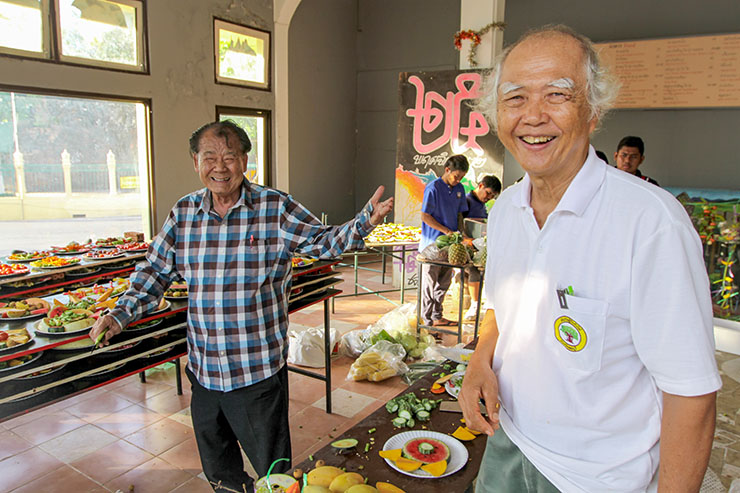
Known as the Lopburi Monkey Banquet or Monkey Buffet Festival, the event that popularized the branding of Lopburi as Thailand’s Monkey City (Mueang Ling) also led to an explosion in the monkey population. That came with problems. The place that feeds monkeys is now covered in signs screaming: “Don’t feed the monkeys!”
Confused? Read our guide to this extraordinary event! With all the Monkey Buffet Festival information you would possibly need, you’ll be ready to monkey around Lopburi!
If you think that feeding wild monkeys is bonkers, what would you say about the African town that feeds - hyenas?
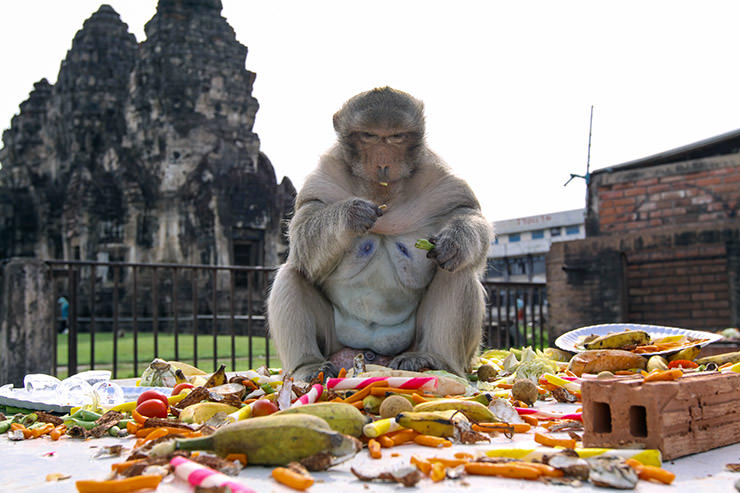
Lopburi Monkey Festival Guide
Where is Lopburi in Thailand?
Lopburi is located in central Thailand, about 150 kilometers north of Bangkok. While it has a relatively small population today (58.000 residents), the city has a historical significance. In the 1680s, during the reign of King Narai the Great, Lopburi was the capital of Ayutthaya Kingdom.
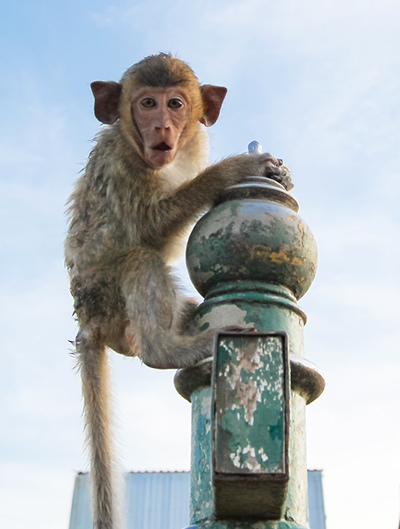
What is the Lopburi Monkey Festival?
Lopburi Monkey Festival is an annual event honoring crab-eating macaques, in a town where they live among humans. With its famous Monkey Banquet or Monkey Buffet, this grand feast is an occasion to get up close and personal with the Lopburi’s cheekiest residents and participate in feeding them.
Why is the Monkey Buffet Festival celebrated?
Monkeys are locally seen as symbols of prosperity and good fortune. By throwing them a great party, the residents express their gratitude for the monkeys’ role in boosting the tourism economy while being an essential part of Lopburi’s cultural identity.
The event also has roots in Hindu mythology, where Hanuman is a revered monkey god from the Indian epic of Ramayana. In local mythology, Hanuman played a key role in establishing Lopburi; he was named its king as a reward for loyalty to Lord Rama when freeing his wife Sita from demon-king Ravana. The macaques are considered Hanuman’s direct descendants, the city’s guardian troops.
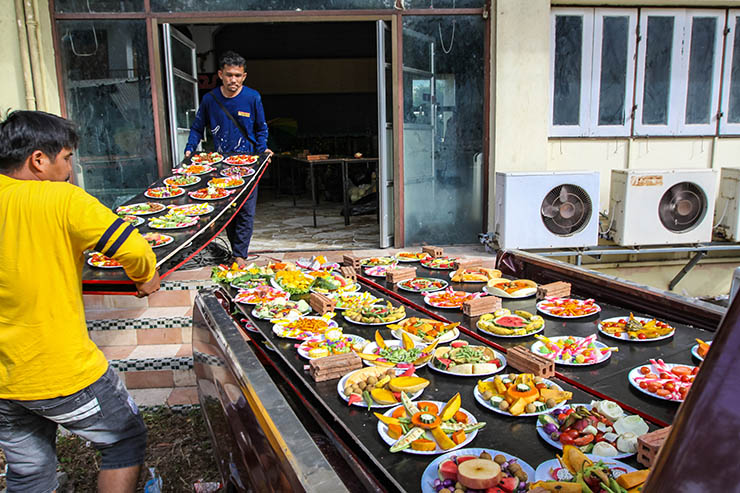
What is the history of the Lopburi Monkey Banquet?
The Monkey Buffet Festival history began in 1989 as a creative way to attract tourists and celebrate the unique relationship between the city’s human and Hanuman population.
A local hotelier Yongyuth Kitwatananusont conceived the idea to turn the Lopburi’s “monkey problem” into a tourist attraction. His creative initiative was conceptualized as a festival. It was also a clever marketing stunt for his hotel that features a monkey as its mascot.
Lopburi Monkey Festival started as a modest gathering, but it quickly gained attention for its uniqueness, attracting visitors from around the world.
My favorite monkey species in the world are Geladas - the grass-eating bleeding-heart monkeys I discovered in Ethiopia while staying at Limalimo Lodge in Simien Mountains.
When is the Monkey Buffet Festival held?
The Lopburi Monkey Festival date is always in November, on the last Sunday of the month. Phra Prang Sam Yod serves as the main venue for the festivities. However, with the removal of the majority of Lopburi’s monkey population to the newly built enclosures, parts of the programs may shift in the future.
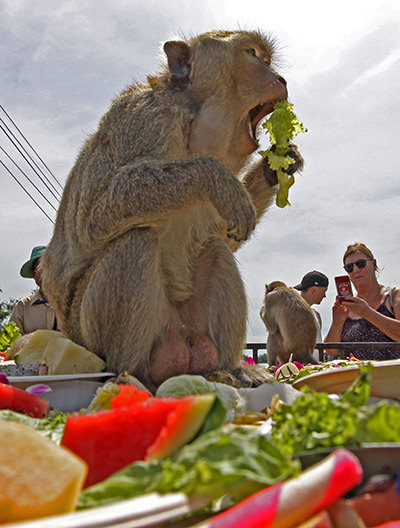
What time is the Monkey Buffet Festival?
Here’s what the current schedule of the Lopburi Monkey Festival program looks like:
09:30 Blessing food at San Phra Karn, with music and dance performances
10:30 Feeding monkeys at the Nursery
12:00 Monkey buffet at Phra Prang Sam Yod
14:00 Monkey buffet at Phra Prang Sam Yod
16:00 Monkey buffet at Phra Prang Sam Yod
Keep in mind that early feedings draw plenty of press photographers who fight for the perfect shot. If you want to have an unobstructed view of the stars of the show, the best time to visit the Lopburi Monkey Festival would be those last two feeding sessions.
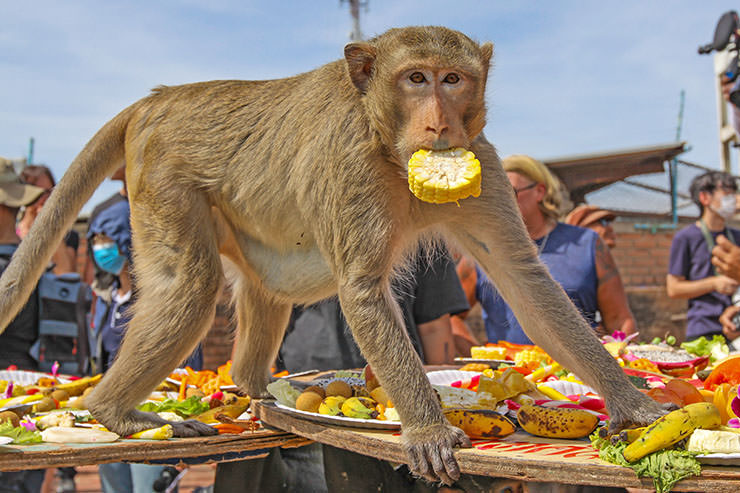
Can you feed monkeys on your own?
According to the decision of the Lopburi Municipality Governor, feeding monkeys and other animals in public areas, roads, and footpaths of Lopburi is prohibited.
Anyone who violates this rule shall be fined, with a penalty fine not exceeding 2,000 baht.
The only two places where the rule doesn’t apply are clearly marked as designated feeding areas. One is in the back of the three-spire Prang Sam Yod, next to the railway tracks, and over at the Phra Khan Shrine grounds.
Monkey Buffet Festival facts
How to pronounce Lopburi: Lop boo-ree How many monkeys live in Lopburi: Approximately 2.000 crab-eating macaques live at the Lopburi enclosure, and 200 of them still claim the heart of the city. Lopburi Monkey Festival price: Access to feeding areas at the Nursery enclosure, as well as at Phra Prang Sam Yot (from the northern side) is free. However, if you want to enter the temple grounds, the admission is 50 baht for foreigners. Amount of food delivered by Lopburi Monkey Festival: 2 tons. Number of plates served at Lopburi Monkey Buffet: 500.
Visit Lopburi Monkey Festival via this 6-minute YouTube video:
The menu of the Monkey Buffet Festival
A day before the Lopburi Monkey Festival, I accidentally stumble upon the festival headquarters. The place would be hard to miss if you were looking for it, though. Ape-themed sculpted chairs show off individuals ranging from a surprisingly lifelike chimp to one resembling the fresco of Jesus after that poor amateur restoration in Spain.
Behind the windows covered in hundreds of colorful plush toys (monkeys, what else?), there is an equally vibrant display of food. Following more naive art principles than Michelin-approved artistry, a dozen of Yongyuth’s hotel employees volunteer to arrange tomorrow’s charming buffet for the town’s most insatiable foodies.
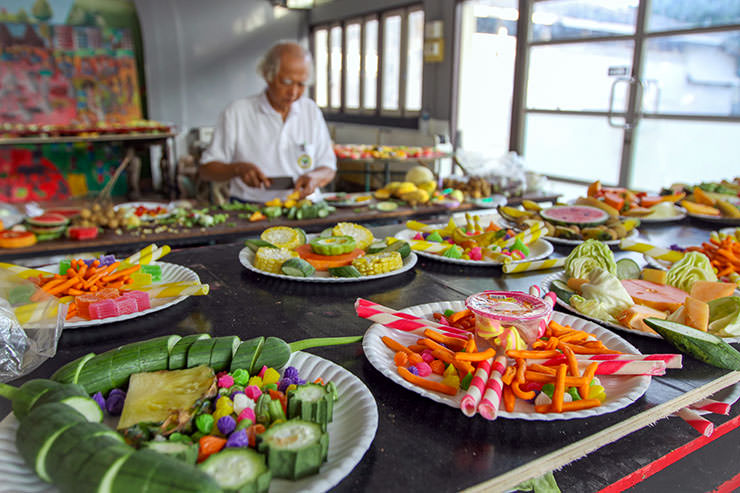
Wibool carefully slices a wheel of watermelon into cake-like portions. With the dedication of a grandfather trying to prepare a nutritious plate for veggie-avoiding kiddos, he garnishes juicy red triangles with some bitter melon and legumes.
A spectrum of colors spills across 500 paper plates stacked over each other on wooden boards, reinforced with bricks for stability. From the yellowness of mango and corn, via the orangeness of carrot sticks and the redness of cherry tomatoes, to pink dragonfruit and purple eggplants, the palette of vitamins awaits our hungry monkey squad. Only the best for the VIPs. That stands for very important primates.
Not everything is health-magazine-approved, however. Among tamarind, longan, and pineapples, there are also colorful meringue cookies and fluorescent wafer sticks competing for attention. Even chocolate bars hanging from rainbow umbrellas sweeten up the menu of the Monkey Buffet Festival.
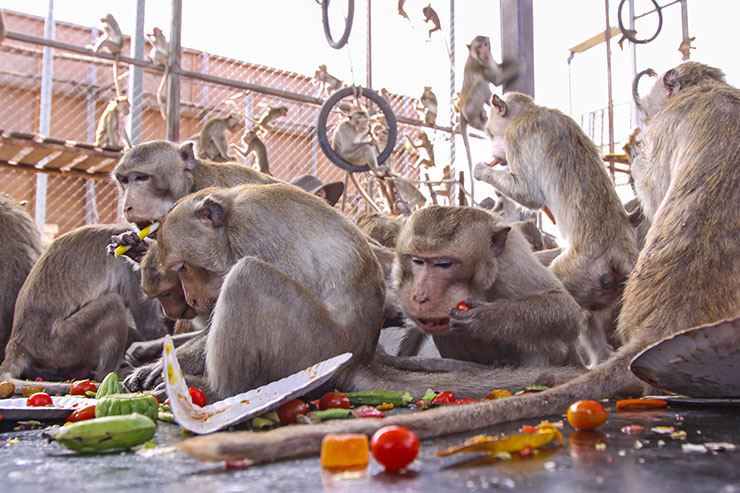
But what do exquisite palates of the most hooting ape critics prefer? It’s not bananas if that was your first guess.
“Their favorite fruit is durian”, Wibool confides, gesturing toward the thorny oval-shaped shells on the floor, hiding the stinky core. They will also fight over the traditional gold-colored Thai sweets, the egg yolk-based thong desserts, he reveals.
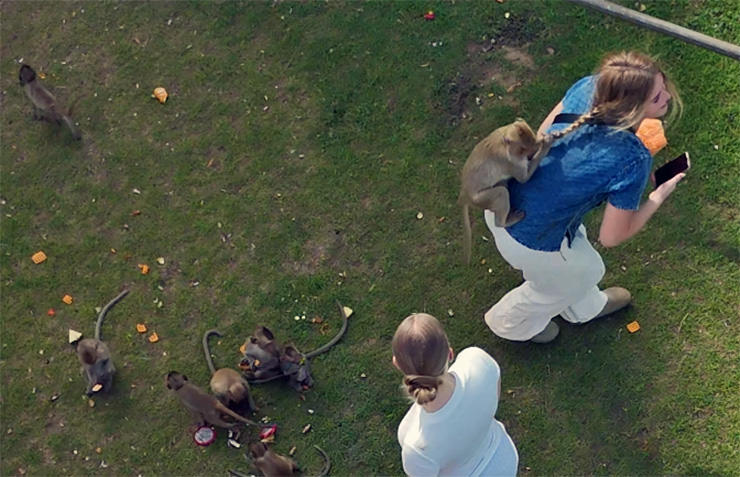
Tips for visitors: How to enjoy the Lopburi Monkey Festival safely
Attending the Lopburi Monkey Festival is a one-of-a-kind experience, but not without challenges. Here's how to enjoy the festivities in a safe way:1. Protect your belongings.
Curious and quick, monkeys are masters of pickpocketing. They will snatch sunglasses, hats, cameras, mobile phones, and even entire bags. Keep your belongings secure (in a zipped bag), especially food and drinks. Avoid loose and dangling objects that might tempt the macaques.2. Don't look them in the eyes.
Sometimes, monkeys can interpret your physical approach as a challenge, and a selfie stick as a weapon. They can perceive staring as a threat. Especially if you encounter an agitated macaque, avoid direct eye contact, slowly back away, and maintain a respectful distance.3. Don't tease the monkeys.
Avoid feeding monkeys by hand or teasing them. If they feel you're withholding food or see you as a competitor, they might become aggressive. Completely avoid larger or dominant macaques. If they feel cornered, that can provoke problems. Respect their space and remember they are wild animals.4. Stay calm.
Keep an eye out for the monkeys. They can appear out of nowhere, and even jump on your back. If they climb on you, stay still and don't panic. Sudden movements may startle them, causing them to scratch or bite. Breathe deeply and let them climb down at their leisure.5. Maintain hygiene.
After interacting with the monkeys or touching surfaces they frequent, sanitize and wash your hands as soon as possible.
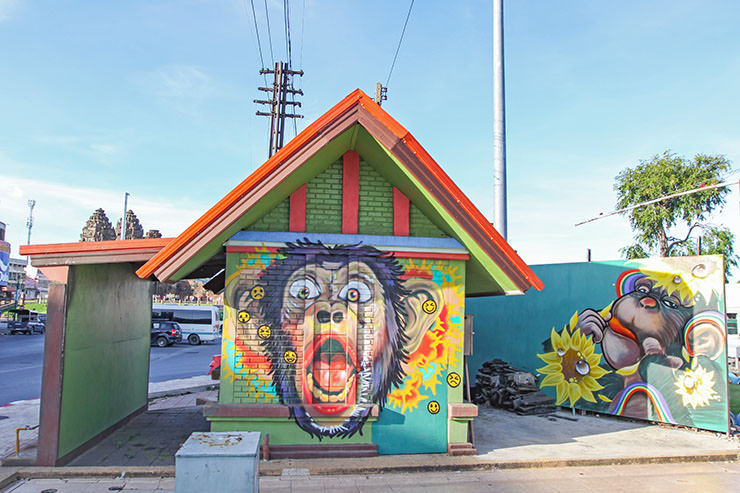
Monkey makes the world go round
Lopburi fully embraced cultural identity based on the co-existence with its playful monkey population. Next to the old Khmer Empire temples appropriated by apes, one can now see urban graffiti and murals depicting furry creatures. Monkey sculptures will be the first thing welcoming you to Lopburi’s train station, and real monkeys will be the last thing you may see before heading to bed.
I stayed at the centrally located Lopburi City Hotel, just a banana’s throw away from Phra Prang Sam Yod. Monkeys were literally hanging around my windows. This hotel, like many other city-center establishments, had to cage itself from the outside world, in order to protect both business and normal life. As I look through the bars outside my room without a view, I start getting an idea of what being in a zoo must feel like.
Check out my first neighbors in this short video!
But those monkeys scaling the city’s human cages are just a tiny fraction of the entire Lopburi monkey population. Compared to a couple of hundred monkeys at Lopburi Monkey Temple, those 2,000 jailbirds at the nursery enclosure resemble a civilization.
Just a weekend before the Lopburi Monkey Festival, 200 monkeys escaped this medium-security prison, causing a riot, and attacking even their first neighbor – the Tha Hin Police Station. Officers were forced to barricade themselves in the station, to prevent monkeys from entering and destroying property or even important evidence.
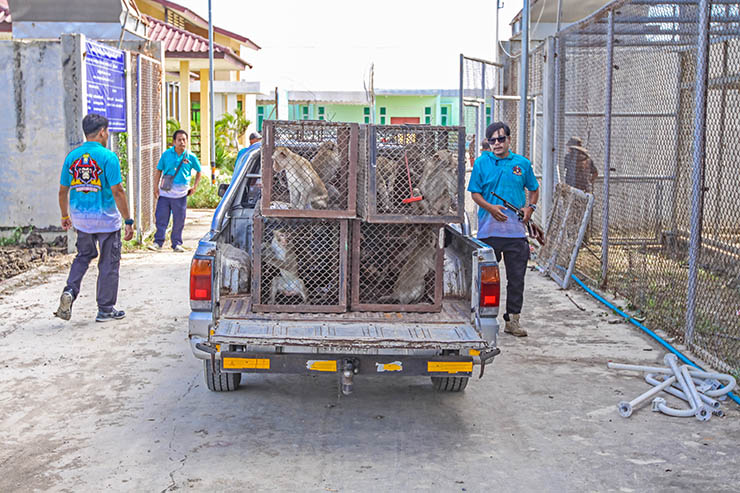
As we arrive at the enclosure on the festival morning, local firefighters, armed with tranquilizer guns and small cages, are still on the hunt for the mischievous few. The operation is successful. In the long run, Lopburi believes that neutering the monkeys can restore peace in this town.
Where to stay in Lopburi?
Location-wise, there's no better choice than the Lopburi City Hotel I chose to stay at. If you can handle barred windows, spotty wifi, and receptionists relying on Google Translate for live communication, you'll be fine with this convenient solution too. To get to the Lopburi Monkey Temple, you'll practically just need to cross the street! Check out the best prices and read reviews for this hotel here. If you want to be fully informed about all the action and not miss a thing, then Lopburi Inn Hotel, owned by the festival's godfather, should be a great choice. Check out the best available price for your room on this link. For more Lopburi hotels and other options of places to stay, check here.
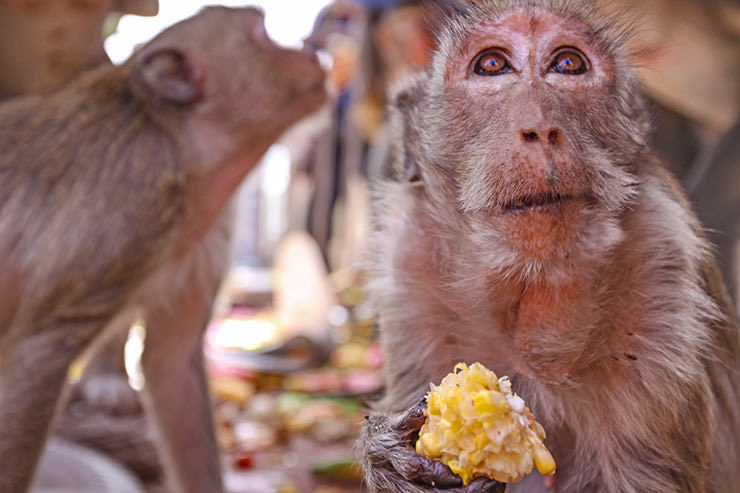
Ape’s appetite at its extreme
After the pandemic lockdowns, monkeys felt the absence of tourists who previously fed them. Even the Lopburi Monkey Festival discontinued its fruit banquets during the Covid era.
So monkeys started robbing the locals, stealing everything from food to phones. They were damaging cars, causing accidents, and even taking over entire buildings. There were even conflicts between different groups which could only be characterized as Lopburi monkey wars.
To protect themselves from the monkey invasion, the people of Lopburi started installing metal grilles around their homes, and even “scary” toy tiger heads in shops. The desperate ones put their properties up for sale.
A stroll through the town in post-pandemic years became unimaginable without carrying a slingshot, a stick, or at least a pellet gun.
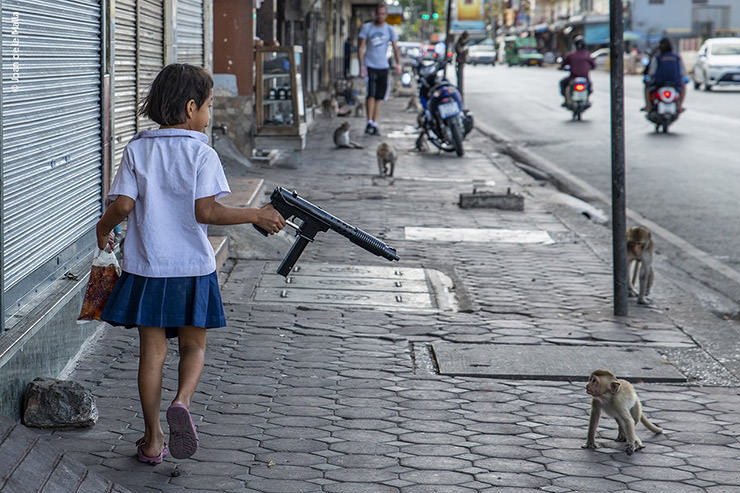
A photograph made by Joan de la Malla, depicting a schoolgirl defending her bag of beverages from a little monkey with a toy gun, went viral. It was even handed over to Prime Minister Srettha Thavisin at the opening of the 2024 King Narai Reign Fair in Lopburi, seeking urgent action.
An unprecedented monkey crackdown followed, with a massive sterilization at Lopburi Monkey Hospital. Because, yes, a town with so many monkeys had to establish even a dedicated hospital, adjoined to the Lopburi Zoo.
Lopburi Municipality Animal Shelter is nowadays the new home for most of them, some 2.5 kilometers away from Phra Prang Sam Yod, the monkey temple they once ruled.
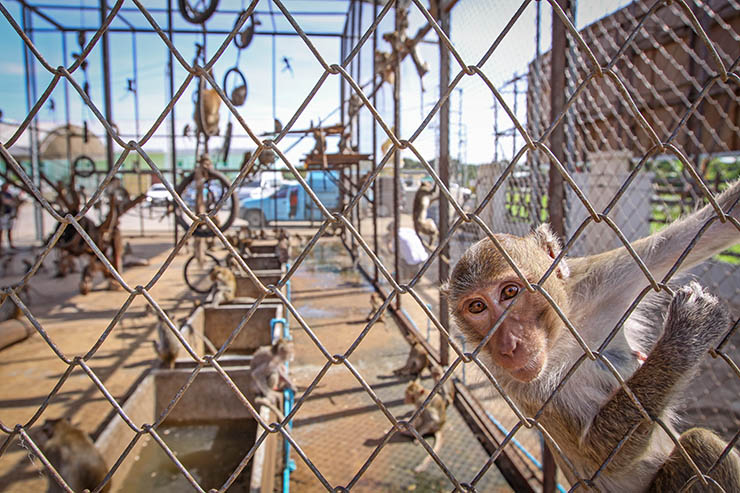
Treating monkeys like kings clearly had dangerous consequences. But the tradition of the Lopburi Monkey Festival continues.
As he proudly shows his daughter’s painting depicting the monkey buffet, I ask Wibool if he has support from his family for this monkey business.
“My wife is a mathematics teacher”, the art professor says. “So no, she is not so happy. She is more into logic.”
Feeding wildlife can change their behavior. Check out what happened with deer in Nara Deer Park, Japan!
Meals on Wheels – Grab Food for monkeys
In Lopburi, the love for monkeys is a delicate balancing act – feeding them is a coin with two sides. It echoes what was seen in places like Bali: regular human feeding made macaques in Ubud Monkey Forest far more aggressive than, for instance, their wilder counterparts in West Bali National Park, where such interaction is forbidden. Feeding the macaques is what makes them dependent on us, and even fuels the potential for incidents.
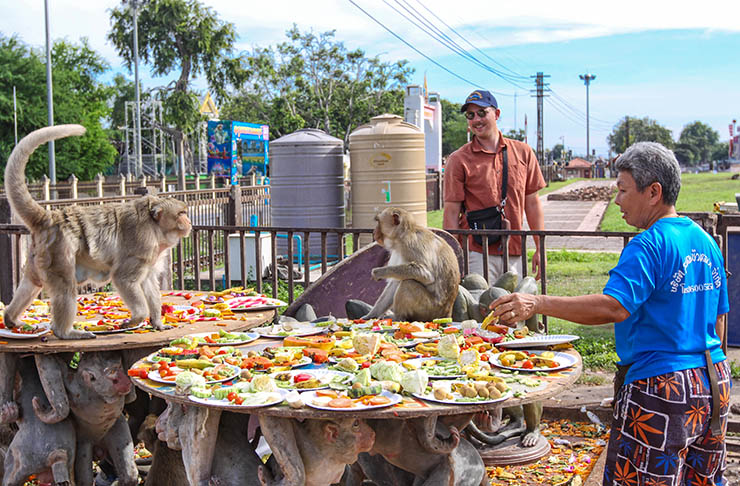
This complexity doesn’t deter Sumalee Srichomphoo from stepping up. The woman who adopted eight cats, and even one goose, found a mission in caring for the wild animals of Lopburi too. For the past twelve years, she’s embraced a peculiar daily routine.
Her day starts at 4 a.m. She hops on her motorbike, and heads to the local fresh market. There, she strolls through the stalls and collects discarded fruit and vegetables from vendors, piling them into large baskets, all before dawn. The kind-hearted monks at Wat Sao Thong Thong allow her to store this treasure trove of produce until the afternoon.
At 3 p.m., Sumalee returns to make the delivery run of her early-morning catch. The destination is Phra Prang Sam Yot, where the Lopburi version of Grab Food starts.
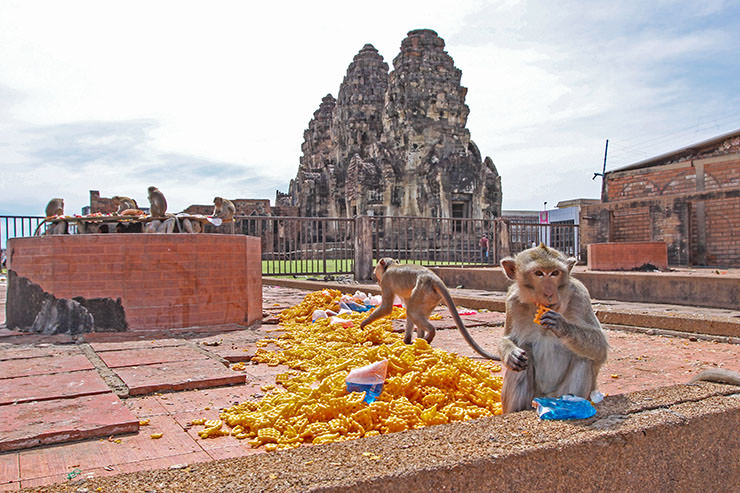
In the backyard of their temple, monkeys experience the all-you-can-eat buffet on a daily basis. They don’t need to wait for the annual Lopburi Monkey Festival to experience the joys of human catering.
Every Sunday, Sumalee joins the monks and brings the weekly supply of food to the monkeys in the Enclosure too.
She might even buy candies in the store and, with a contagious laugh, spread them among the voracious gang.
It might feel like adding fuel to the fire, but on the other hand, this daily sacrifice is what keeps the truce with the monkeys alive.
See Sumalee’s feeding routine featured in our Pipeaway Walks series!
How to reach Lopburi?
Getting to Lopburi is a breeze, with various convenient transport options connecting the city to Bangkok and beyond. Here are the best ways to reach Lopburi:1. By train
The train is the scenic, affordable way to travel to Lopburi. Trains to Lopburi depart from Bangkok's Krung Thep Aphiwat Central Terminal (stopping at Don Mueang and Ayutthaya among others, too). The journey takes about 2 hours and brings you to Lopburi Railway Station, located near key attractions like Phra Prang Sam Yod. Personally, I traveled to Lopburi from Ayutthaya, by an ordinary train that had only the 3rd class seats. The ride was 70 minutes long and cost just 13 baht (36 cents). A rapid train that takes just under an hour would cost 20 baht in the same class, or 60 baht in the second class. For those in a hurry, there is also a special express train with 2nd class seats in the morning - it cuts the journey time to 33 minutes but raises the price to 260 baht. If you want to book your train ticket online (advance booking is strongly recommended when traveling in high season), do it here.2. By bus or minivan
Buses and minivans are more frequent than trains. Their departure point in Bangkok is the Mochit Bus Terminal (Northern Bus Terminal). Minivans and buses to Lopburi leave regularly, practically every half an hour. Travel time from Bangkok to Lopburi should be between 2.5 and 3 hours, depending on traffic. A one-way trip typically costs at least 300 baht. Explore your options on this site.3. By car or taxi
Driving to Lopburi offers flexibility and convenience, especially for groups or those with lots of luggage. The journey via the Highway 1 is up to 200 kilometers and takes approximately 3 hours. Car rental is available at Bangkok airport and city centers, with rates starting at around 3,500 baht per day. Easily compare prices and options on this link! A taxi or a private driver will cost about 3.000-4.500 baht for a one-way trip. A well-rated choice is this return trip for 3.800 baht (105 euros).4. By tour package
For a hassle-free experience, you can book a Lopburi day trip from Bangkok. A package that includes transportation, a licensed English-speaking tour guide, and a visit to the historical temples of Ayutthaya, is available for 53 euros per person. Check it out!
Lopburi Monkey Festival – Conclusion
With the luxury of having personal butlers and the energy provided by endless buffets (complete with desserts and even soda drinks – a perfect fuel for the sugar rush), monkeys in Lopburi had stimulating conditions for a population boom.
But with a soaring population and food stocks staying the same, Pandora’s box opened up during the pandemic, bringing macabre macaque nightmares to Lopburi.
The Monkey Town, a place that tried to celebrate their furrier inhabitants, now had to encage them. Environmentalist organizations are not happy with the controversial solution of the Enclosure. They see it more as a confinement than a coexistence. But at the moment, the alternative is – problems.
Monkeys should definitely not be left to die of hunger. But Lopburi owes its macaques more than just survival
The Lopburi Monkey Festival remains a celebration of culture, history, and harmony between humans and animals. But it also contributed to the issues monkeys are experiencing today. What began as a gesture of gratitude has grown into a cautionary tale about balance.
Sterilization programs may eventually reduce Lopburi’s monkey population in the following years. But that also means that most of these newcomers to the so-called monkey paradise of Lopburi will have to spend a lifetime – behind bars.
The responsible thing to do is definitely not to let them die of hunger. But Lopburi owes its monkey citizens more than just survival; it owes them dignity. The solution cannot be to choose who should spend their life behind bars, humans or monkeys. Both species call Lopburi home. Monkeys were around when it was still a jungle.
So Lopburi should make the living conditions of the encaged monkeys much better than they currently are. This is how responsibility in hospitality works. The one who prepares the feast often ends up doing the dishes.
What’s your take on celebrating animals in festivals like the Lopburi Monkey Festival?
Leave your comment below and pin the article for later!
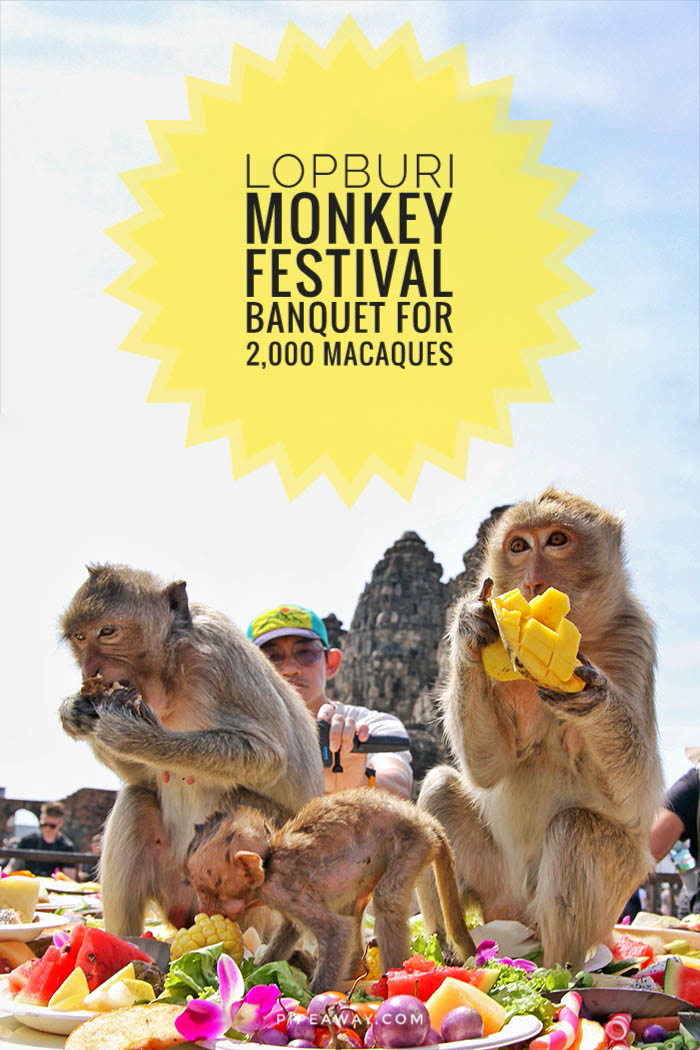
Disclosure: This post may contain affiliate links, meaning if you click on them and make a purchase, Pipeaway may make a small commission, at no additional cost to you. Thank you for supporting our work!

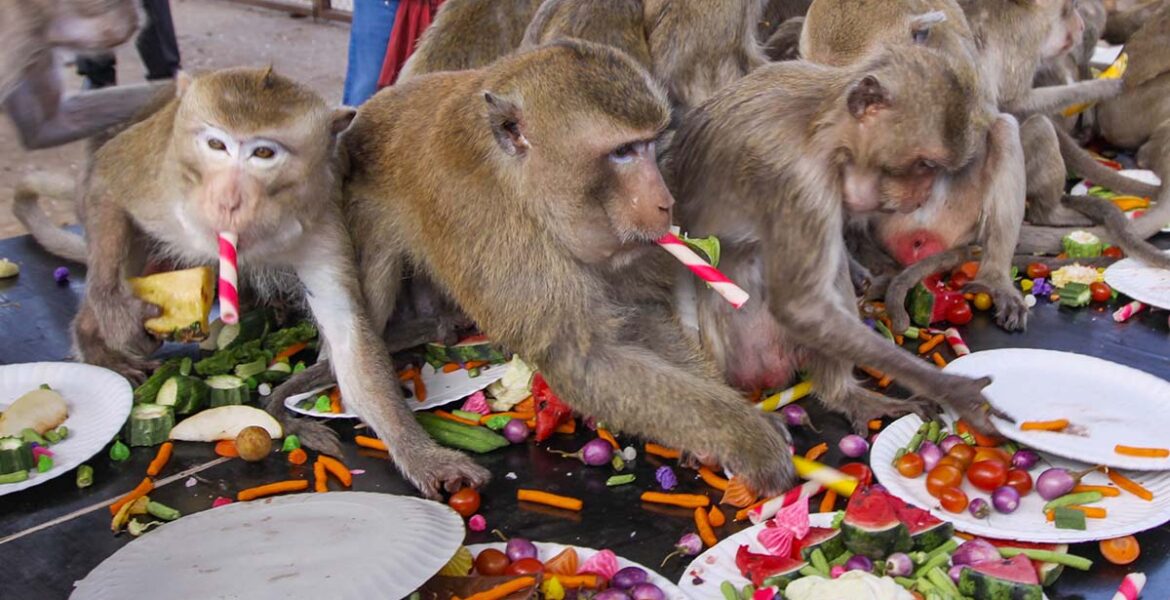

This is one festival I hadn’t heard of before. Do the monkeys get sick after eating all of this food they normally don’t eat (like the sweets, chocolates)? It seems to me you’d have a bunch of sick monkeys on your hands unless people are actually feeding them during the year.
Great question, Sonia!
The Lopburi Monkey Festival is definitely a feast like no other, but the organizers are mindful of the monkeys’ health. While the buffet includes indulgent treats like sweets and chocolates, the focus is primarily on fruits and veggies, which make up the bulk of the offerings.
These macaques are fed regularly throughout the year by locals and temple volunteers, so they’re used to a fairly balanced diet. But it is also true that they live among humans and, as omnivores, they probably do find “forbidden fruit” on a daily basis too. So they might have acquired the sweettooth taste.
Of course, some monkeys do go a little overboard on festival day (who wouldn’t with all that sugary temptation?). Fortunately, their daily meals and snacks help keep them healthy the rest of the year. Probably, being hyperactive (and mischievous) helps them channel all that energy taken in through food.